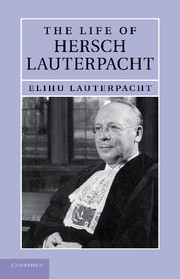Book contents
- Frontmatter
- Contents
- List of plates
- Acknowledgments
- List of abbreviations
- Prologue and introduction
- 1 Background and early years, 1897–1919
- 2 Vienna: research, engagement and marriage, 1919–1923
- 3 England and the London School of Economics, 1923–1937
- 4 Cambridge, 1937–1939: the Whewell Chair
- 5 The war years, Part I: September 1939–January 1941
- 6 The war years, Part II: February 1941–March 1942
- 7 The war years, Part III: April 1942–December 1944
- 8 Human rights
- 9 The years of practice, 1945–1950
- 10 1950–1954
- 11 The International Court of Justice, 1955–1960
- Epilogue: the man
- Appendix 1 The published writings of Sir Hersch Lauterpacht
- Appendix 2 Biographical and academic writings on Sir Hersch Lauterpacht
- Appendix 3 Obituaries of Sir Hersch Lauterpacht
- Appendix 4 Chronology of significant events in the life of Sir Hersch Lauterpacht
- Index
Epilogue: the man
Published online by Cambridge University Press: 01 June 2011
- Frontmatter
- Contents
- List of plates
- Acknowledgments
- List of abbreviations
- Prologue and introduction
- 1 Background and early years, 1897–1919
- 2 Vienna: research, engagement and marriage, 1919–1923
- 3 England and the London School of Economics, 1923–1937
- 4 Cambridge, 1937–1939: the Whewell Chair
- 5 The war years, Part I: September 1939–January 1941
- 6 The war years, Part II: February 1941–March 1942
- 7 The war years, Part III: April 1942–December 1944
- 8 Human rights
- 9 The years of practice, 1945–1950
- 10 1950–1954
- 11 The International Court of Justice, 1955–1960
- Epilogue: the man
- Appendix 1 The published writings of Sir Hersch Lauterpacht
- Appendix 2 Biographical and academic writings on Sir Hersch Lauterpacht
- Appendix 3 Obituaries of Sir Hersch Lauterpacht
- Appendix 4 Chronology of significant events in the life of Sir Hersch Lauterpacht
- Index
Summary
By way of conclusion of this account of the life of Hersch Lauterpacht, it seems appropriate to recall briefly his principal characteristics.
HIS PERSONALITY
Hersch was brought up in an orthodox but not extreme Jewish family. He was imbued with a Jewish spirit that was not expressed in purely local terms. He absorbed in the family home a strong feeling of Zionism in its earliest form – a belief in the importance of the establishment of a Jewish National Home in the land of Israel that had for so long played a central part in Jewish history. It could not then be foreseen that the fulfilment of this ideal would in due course lead to the sad contentions that have marked the development of Israel and its relations with its neighbours since its establishment as a State in 1948. For Hersch, Zionism was a pure ideal to be pursued on the basis of historical knowledge, education and restraint.
He absorbed from his parents the ritual of the orthodox Jewish faith without being inclined to follow it in any detail. His attendance at synagogue was limited to the high holy days of the New Year and the Day of Atonement. When, many years later, he became a professor at Cambridge, he would go to the students' synagogue on such occasions in academic dress, wearing a gown and a mortar board, and would occupy a seat in the front row as befitted his status.
- Type
- Chapter
- Information
- The Life of Hersch Lauterpacht , pp. 423 - 429Publisher: Cambridge University PressPrint publication year: 2010

